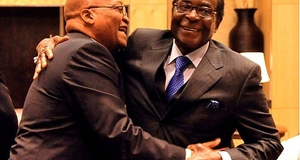Regionalism—the efforts of a group of nations to enhance their economic, political, social, and cultural interaction—can assume various forms, including regional integration/cooperation, market integration, development integration, with the intent of accommodating the changing national, international, and regional environment. Despite the fact that to this day, attempts at integration (in particular, market integration based on the EU model) and regionalist impulses as they currently occur have been entirely unproductive throughout the African continent, regionalism continues to be regarded by African leaders as a reasonable strategy for increasing intra-regional trade and for reversing Africa's rising marginalization in the world economy.
They continue to be assured by the success of the North American Free Trade Agreement (NAFTA) and the viability of the European Union's (EU) model for integration, which begins with a free trade area or preferential trade area and ends with complete economic integration. The EU model features a specific mode of decision making (qualified majority voting), conflict resolution mechanism (role of the European Court of Justice), budgetary arrangements (revenue collection and distribution), and citizen involvement (direct elections to the European Parliament) and takes on increasingly state-like functions. While extremely successful in integrating its constituent member states in Europe, as a model it is limited, given the unique circumstances under which it was established and promoted. As noted by Emil Kirchner:
Consideration of the EU as a model for other regional integration settings might be limited, given the unique circumstances in which it was established and promoted. Born out of conflict, the EU benefited from special circumstances in its development, e.g. the Cold War, the United States guarantee and nurturing role, and the industrialised nature of the European economies, which are not found elsewhere. (4)
Because of the achievements of NAFTA and the mass movement toward EU monetary integration, the Abuja Treaty was signed in 1991 by the member states of the Organization of African Unity (OAU) thereby creating the African Economic Community (AEC), a regionalist initiative that lays the groundwork for mutual economic development among the African states, the creation of free trade zones, and the establishment of economic and monetary union by the year 2025. Given past examples of the ineffectiveness of presentday practices of regionalism in Africa, it is not shocking that the AEC was formed after the failure of the 1980 Lagos Plan of Action for the Economic Development of Africa, a plan drafted by the OAU that was to be the basis for African self-sufficiency and the creation of an African economic community by the year 2000.
With respect to Africa and in light of the futile pursuits of regional integration policies there, I argue that if regionalism in the region is ever to succeed to and to lead to integration with the world economy, a new model of regionalism must be formed. Instead of attempting to integrate their economies on the regional level using the EU model, African leaders should endeavor to modify their concept of regionalism and then to integrate their economies into the world economy, a process that will facilitate the growth and development necessary to prevent Africa's further marginalization by the superpowers because, in the words of tralac Associate Professor Colin McCarthy, "even if regional integration could in the end succeed as a formal exercise, sustainable growth will require competitiveness in world markets". This is not to say that practices of regionalism should be abandoned altogether but should be made to coexist with globalization after the theory behind them is amended.
For one, regionalism (as it has been recently applied) alone cannot defend Africa from the evermore prevalent global economy, which is to suggest that "Africa will only begin to grow again if it opens itself up to the financial and trade flows of the world economy" (Herbst); two, it would be "best for sub-Saharan Africa to integrate with the EC [European Community or European Union] and reap all the possible benefits" since "the temptation to use regionalism as a vehicle for importsubstituting industrialization will only divert attention from efforts to integrate sub-Saharan Africa with the world economy" (de Melo and Panagyria 20); and third, "there are areas, including Africa, where there are proposals [for regional integration], but where the political and social conditions seem no easier to meet than those for global integration. In these, it is difficult to see any argument (except perhaps that of limited bargaining ability) for regions as an alternative or supplement to global integration" (5). However, if revised to suit African realities and combined with an embrace of the world economy, regional formations on the continent could finally produce the constructive outcomes they were intended to.
Once interconnected through the experience of colonialism, the various African nations have more recently been interconnected by neocolonialism (defined as contemporary economic imperialism) and now through the stateless forces of globalization, all of which have restricted their development into individual and self-sustaining entities. Despite the insistence of imperialist historiographies that 19th century European colonialism should be extolled as "a source of light for ‘Darkest Africa'" (Duignan and Gann 3), the encounter between Africa and Europe was essentially antagonistic.

The African Union, established 2002, is the successor organization to the Organizattion of African Unity.
The ethnocentric bias and narrow self-interests that dictated the actions of colonial rulers of the time continue to have a negative impact, first in the form of neocolonialism and then in that of globalization. Indeed, the close economic ties between former colonies and former colonial powers favor the argument that the latter established mechanisms by which to continue their control over newly emergent African countries, even after their independencethe very definition of neocolonialism. For instance, though it gained independence from Britain (its one time colonial administrator) in 1960, one of Nigeria's major partners in external trade today is the United Kingdom (Ekpoh and Umo).
Even in 1989, the Federal Military Government of Nigeria was citing "the enhancement of Nigeria's relations with member countries of the European economic community (EEC)" (Matthews 168) as one of the priority issues of the country's foreign policy. As we can see, "the roots of Nigeria's post-independence politics are deeply entrenched in its colonial history" (Osaghae 1) and it is therefore highly likely that many of the country's modern economic malformations "are a direct consequence of the state-building and economic integration processes begun under colonial rule" (1).
Now the era of neocolonialism is giving way to a more subtle method of colonialist management: globalization, a process of transformation that has activated for Africa the veritable "race to the bottom" and has created for the continent an environment in which multinational corporations, in alliance with some of Africa's most corrupt leaders, exploit the land for its natural resources, leaving the population to underdevelopment, poverty, and destitution.
Once regionalist theories are reevaluated, however, such downsides may effectively be eliminated. While I understand that the interests of some of the world's most powerful industrial nations as well as the legacy of the region may stand in the way of such a reevaluation, this is separate problem and one I encourage other scholars to address. Rather, this paper proposes a solution to the region's misguided appreciation for the EU model of economic integration, assuming in its course that such a solution is indeed possible.
Of the three interconnecting experiences I have mentioned and briefly describedcolonialism, neocolonialism, and globalizationour focus will be the last of these—specifically, the regional integration processes that are attractive to Africans as a result of globalization's widespread prevalence. It is the purpose of this paper to argue that by resorting to regional integration alone in the face of globalization, turning a blind eye to its pervasiveness, Africa is conducting its own demise, expediting the dismantlement of their own failing postcolonial developmental states.
While it may seem logical of Africa to respond to the devastating effects of globalization by fostering economic unity using a model that has been previously met with obvious success, it would be more intelligent to abandon this ideal and take into account the region's unique realities so that it too may one day profit by globalization, a force that will undoubtedly continue to grow in strength. After all, because of the elite and hegemonic United States' ability to "set the [global] agenda, define [crises], and mobilize support for policies among both countries and nongovernmental forces" (Zakaria 247), the ideology of neoliberal economic integration will only become increasingly more dominant on the world stage.
Critics of my argument would contend that because the forces of globalization have visibly enhanced the prosperity and prominence of many nations (such as the United States, China, and India), they are now widely and erroneously viewed as a fail-safe route to increased peace and wealth. They would also assert that I in my position have failed to remember that the transformative changes associated with globalization are typically reserved for the already advanced democracies (with the exception of China, a nation characterized by a rare combination of illiberal domestic policy and capitalistic economic systems), and that desperately poor and institutionally weak nations such as Africa are unable to confidently meet the national security threats (such as terrorist organizations) to which globalization contributes as they lack the attributes of the US (such as its size, power, and wealth) that allow it to moderate the effects of globalization/provide insulation for itself against disruptive forces.
While the United States, my critics would continue, with its democratic domestic political processes, can maintain autonomy by eschewing the global market or, by embracing the market, gain new capacities, Africacharacterized by low living standards, absence of foreign and domestic investment, shortages, privation, foreign exchange scarcities, moderate capacities for governance, etc.falls prey to a diffusion of control that reinforces institutional malformation (Avant 106) and that encourages attempts at EU-inspired regionalization. Today, they persist, the consensus on the imperative of global economic integration has led to a perversion of priorities such that the implementation of standardized integration strategies has become a substitute for the design of country-specific development alternatives. In the words of economist Dani Rodrik:
Advocates of global economic integration hold out utopian visions of the prosperity that developing countries will reap if they open their borders to commerce and capital. This hollow promise diverts poor nations' attention and resources from the key domestic innovations needed to spur economic growth.
To summarize the case of my opponents: widespread confidence in global integration policies among the elite, advanced nations of the world encourages poor nations such as Africa to divert administrative capabilities, human resources, and political capital away from development priorities and to devote these assets to attempts at integration that will ultimately undermine their nascent democratic institutions.
These critics are the same who argue in favor of strict regional integration processes, simultaneously ignoring the inevitably of globalization and forgetting that while EU-based schemes for successful regional integration have been worthwhile in the more advanced Western nations, they have yet to evolve in the developing African nations. For one, background conditions favorable to EU-based regional integration do not exist, a concern of the neofunctional theorists who observe the limited capacities and malformation of Africa's institutions.
However, if Africa were forced to face the challenges of increasingly invasive globalization, it will simultaneously be forced to undergo extensive and ultimately beneficial institutional reform. Secondly, and in the same vein, the corruption and limited authority of African leaders (in other words, their merely moderate capacities for governance) produces weak institutional structures that render regional integration-which would serve only to group these feeble institutions and abusive leaders togethera nonsensical choice. Again, if compelled to integrate with the world economy, Africa would be obliged to undergo positive reforms so as to be more compatible with western ideals of political and social liberalism.
Thirdly, integrative movements in Africa result in observably unequal economic distribution between the African nations because of a lack of clarity in the formulation of distributional strategies. While it is true that global (as opposed to regional) integration may also result in an unequal distribution of gains between rich and poor countries (as well as obvious disparities in affluence and serious asymmetries in social, economic, and political opportunities), it is more probable that said gains (economic or otherwise) will be balanced out with the US acting as principal moderator over questions of apportionment.
The words of game theorist John Nash are of note in "The Bargaining Problem", at the center of which he argued that the question is not whether a particular arrangement is better for everyone than no cooperation whatsoever, but whether there is a fair division of benefits (that is, a fair distributional arrangement results from cooperation). Due to its dynamic, open, multicultural society, incomparably sized military, high standards of education, and newfound position to restore its worldwide legitimacy under President Obama, it is likely that the US, despite a relative diminishment in power, will remain a hegemon, creating conditions under which the "fair division of benefits" and higher levels of sustainable wealth in Africa are more likely to occur.
Fourthly, African nationalism, which arose in response to the colonial state and traditional dynastic identities as a mode of resistance, poses a challenge to regionalism. Though written twenty-three years ago, it is still true today that the "net effect" of regionalism has been "the creation of regional entities whose institutions exhibit limited or non-supranational characteristics which allow the leaders of member-states to protect the interests of their national entrepreneurs while discriminating against non-nationals. Competition and antagonism often result in the breakdown of integrative systems" (Okolo 122).
Such regionalist behavior is combated by Africans who would prefer nationalism to be the official state ideology and whose focus is the African nation in its entirety. By engaging in global economic integration, the various African nations could be addressed on an individual level based on what they personally have to offer to exchange whereas by engaging solely in regional integration, the nations are thrust into a single and barrier-less collection. And fifthly, not only do the doctrines of regionalism and nationalism compete, there is also ideological competition between regional partners whose orientations differ on issues such as foreign private enterprise, policies toward opposition parties, the allocation of industries on a regional basis, the set up of foreign trade, the role of the state, domestic socioeconomic policies, etc.
Having now examined the basic flaws in the strict pursuit of regionalist policies, we will now examine those of the strict pursuit of globalization/neoliberal policies with the intent of gradually illustrating why such policies are most effective if combined. Neoliberalismthe redefinition of classical liberalism as an orthodoxy of limited government intervention, privatization, the demise of the welfare state, and the so-called Washington Consensushas been at the center of African economic policy in the form of IMF/ World Bank Structural Adjustment Programs (SAPs), which have failed to reduce the African countries' marginalization within the world economy.
While the demand for the removal of trade barriers and for more outwardlyoriented trade policies has done more to open the economies of Africa than has any regional economic organization, such liberalization has not produced increased intra-regional trade among the African countries, but instead with the core states of the capitalist world economy. This trade, furthermore, is primarily one-way with the core capitalist countries flooding the African periphery with more efficiently produced and/or cheaper products that render the African industrial sector unable to compete and thus lead to massive de-industrialization. Globalism is, according to Robert Keohane and Joseph Nye "a state of the world involving networks of interdependence at multicontinental distances.
The linkages occur through flows and influences of capital and goods, information and ideas, and people and forces, as well as environmentally and biologically relevant substances (such as acid rain or pathogens). Globalization and deglobalization refer to the increase or decline of globalism". For Africa in general and for regionalism in particular, the ramifications of globalization have been significant. Because of it, Africa has been further marginalized in the world economy and the sub-Saharan African countries "remain constrained by weak supply and demand capabilities, while lacking institutional capacities. They are, therefore, also less able than other countries to reap potential trade/ investment/ technological transformation benefits from globalisation, whereas for other communities it has contributed to increased impoverishment, inequalities, work insecurity, weakening of institutions and social support systems, and erosion of established identities and values.
Thus, for a considerable amount of people, this leads to less human security, more vulnerability and increased social conflict" (Boas, Marchand, and Shaw). In spite of the fact that sub-Saharan African nations are already partially integrated with the world economy because of their export activity, these exports are subjected to the characteristic price fluctuations of the global market (particularly now that the global financial market turmoil has slowed global growth and demand for Africa's exports), while Africans continue to refuse to diversify their exports towards more dynamic primary commodities and manufacturing goods, both of which are less prone to the vagaries of international markets and attract more significant foreign investment. By seizing upon globalization opportunities alone, Africans compromise their own workers, industries, and regional partners.
Take, for instance, the case of the EU-South Africa FTA (Free Trade Agreement) (implemented in 2000 and still in effect today), an agreement on trade, development, and cooperation between the European Community and its member states and the Republic of South Africa, signed by South Africa with full knowledge that it would have disastrous consequences for both the Southern African Customs Union (SACU) and the Southern African Development Community (SADC). Although a SACU treaty stipulates that all such treaties and agreements must be approved by all members, none of Botswana, Lesotho, Namibia, or Swaziland were consulted. As to the SADC community (comprised of some 15 African countries as of July 2005), it was intimidated by the possibility of lower-priced and more efficient EU goods penetrating its markets and undermining its agricultural sector as well as frustrated by South Africa's cooperation with the EU itself, negotiations with which lead South Africa to feel so comfortable with integration into the world economy that it became unmindful of (or perhaps simply accepting of) the consequences that such an action could have for its own South African economy.
Furthermore, the US, naturally apprehensive about the progress the EU has made in penetrating South African markets, has entered into discussions with South Africa about proposals for a US-SA FTA, the inception of which would only exacerbate the consequences of capitalist ventures into South African markets and feed into the ideology of South African exceptionalsim, an idea reflecting South Africa's belief that it differs qualitatively from all other African nations when it has actually not "managed to ‘escape the [colonialism-imposed] fate suffered by the continent'" (Lazarus).
Not only would the adoption of this ideology inflate South Africa's sense of worth in matters of economic decision-making, it would also alienate the other members of the SADC. About the negative consequences of EU and US-SA FTAs, Willem Bosman, Director of Regional Economic Organizations within the South African Ministry of Foreign Affairs, pronounced that SACU members would have to be told that "you are on your own. South Africa cannot any longer provide for you 50% of your budget… Now you have to tax your own people; you have to work according to the structures of a free independent country"a statement that suggests South Africa's loss of economic hegemony because of a new dependence on the capitalist core and expired need for the other SACU countries (bound to suffer) as a market for their agricultural and non-international competitive manufactured products. Should open trade regimes and integration into the world economy (in essence, globalization and neoliberalism) fail to satisfy South Africa's unique economic needs, the SACU countries will have so far deteriorated economically that they will no longer be able to purchase South Africa's productsa risk to which South Africa pays frighteningly little attention.Continued on Next Page »





















